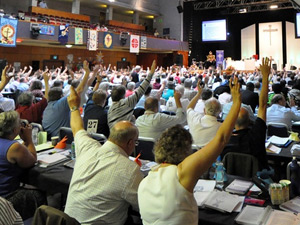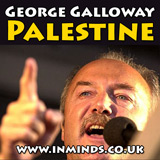
 Innovative Minds © 2014. All Rights Reserved. www.inminds.co.uk | ||||||
Methodist Church to boycott goods from illegal Israeli settlementsThe Methodist Church The Methodist Church has today voted to boycott all products from Israeli settlements in the Palestinian territories, and to encourage Methodists across Britain to do the same.  Methodist Conference vote to boycott Israeli settlement goods The decision is a response to a call from a group of Palestinian Christians, a growing number of Jewish organisations, both inside Israel and worldwide, and the World Council of Churches. A majority of governments recognise the Israeli occupation of Palestinian territories as illegitimate under international law. Christine Elliott, Secretary for External Relationships, said, âThis decision has not been taken lightly, but after months of research, careful consideration and finally, todayâs debate at the Conference. The goal of the boycott is to put an end to the existing injustice. It reflects the challenge that settlements present to a lasting peace in the region. âWe are passionate about dialogue across communities and with people of all faiths. We remain deeply committed to our relationships with our brothers and sisters of other faiths, and we look to engage in active listening so that we act as agents of hope together.â In December, Defra introduced new advice on labelling, recommending that packaging of products imported from the West Bank should distinguish between Palestinian areas and Israeli settlements. The Conference also adopted a statement calling for a full arms embargo against all sides in the conflict. âThis conflict is further fuelled by partisan support by other countries. Violence from all parties in this conflict must be denounced, and a just peace sought for all peoples living in the region,â said Christine. The move to boycott is just one among a number of measures agreed by the Conference, which also include a commitment to regular and informed prayer for the needs of those in region. Methodists across Great Britain are also encouraged to visit the region, write to their MPs and engage in respectful dialogue with Jews and Muslims on this issue. Source: http://methodist.org.uk/index.cfm?fuseaction=opentogod.newsDetail&newsid=453
UK Church to boycott Israeli goodsJonny Paul, Jerusalem Post The Methodist Church of Britain voted on Wednesday to boycott Israeli-produced goods and services from the West Bank because of Israelâs âillegal occupation of Palestinian lands.â âA majority of governments recognize the Israeli occupation of Palestinian territories as illegitimate under international law,â the church body said at its annual conference in Portsmouth. The church body will now encourage Methodists across the UK to follow suit. The motion stated that the boycott of goods âfrom illegal Israeli settlementsâ was in response to a call by the World Council of Churches â which advocates divestment from Israel â and by Palestinian civil society and âa growing number of Jewish organizations in Israel and worldwide.â âThe Methodist Conference notes the call of the World Council of Churches in 2009 for an international boycott of settlement produce and services and the support given for such a boycott by Christian leaders in Palestine in the Kairos document, Palestinian civil society and a growing number of Jewish organizations both inside Israel and worldwide and calls on the Methodist people to support and engage with this boycott of Israeli goods emanating from illegal settlements,â the church said. Last year, the Methodist Church set up a working group to âwork for an end to the Occupation, an end to the blockade of Gaza, adherence to international law by all sides and a just peace for all in the region.â The resulting 54-page report produced by the church body, titled âJustice for Palestine and Israel,â met with a fierce condemnation by the Board of Deputies of British Jews, the Council of Christians and Jews and British Chief Rabbi Jonathan Sacks. In a statement released after Wednesdayâs vote, the church body said the decision, which carried unanimously, had the goal of ending âthe existing injustice.â âThis decision has not been taken lightly, but after months of research, careful consideration and finally, todayâs debate at the conference,â said Christine Elliott, secretary for external relationships. âThe goal of the boycott is to put an end to the existing injustice. It reflects the challenge that settlements present to a lasting peace in the region.â Jewish community leadership organizations reacted with dismay. In a joint statement, the Board of Deputies of British Jews and the Jewish Leadership Council said it was, âThis is a very sad day, both for Jewish-Methodist relations and for everyone who wants to see positive engagement with the complex issues of Israeli-Palestinian relations. The Methodist Conference has swallowed hook, line and sinker a report full of basic historical inaccuracies, deliberate misrepresentations and distortions of Jewish theology and Israeli policy. âThe deeply flawed report is symptomatic of a biased process: The working group which wrote the report had already formed its conclusions at the outset. External readers were brought in to give the process a veneer of impartiality, but their criticisms were rejected. The reportâs authors have abused the trust of ordinary members of the Methodist Church, who assumed that they were reading and voting on an impartial and comprehensive paper, and they have abused the goodwill of the Jewish community, which tried to engage with this issue, only to find that our efforts were treated as an unwelcome distraction,â the statement said. David Gifford, the chief executive of the Council of Christians and Jews, said he was disappointed that the Israeli narrative was not heard during the debate. âI was very disappointed at the emotive nature of the debate which again did not hear fairly also the pain and cry of the Israeli,â Gifford said. âIt was right to hear the pain of the Palestinian but in the end the vote of the Methodist Conference was to boycott goods and services that originate from the West Bank. We shall have to see how this will affect future relationships of the Methodist Church with other churches, the CCJ [Council of Christians and Jews] and with the British Jewish community.â The Board of Deputies said the conference should âhang its head in shame.â âThis outcome is extremely serious and damaging, as we and others have explained repeatedly over recent weeks. Israel is at the root of the identity of Jews and of Judaism, and as an expression of Jewish spiritual, national and emotional aspirations. Zionism cannot simply be ruled as illegitimate in the way that the conference has purported to do. This smacks of breathtaking insensitivity, as crass as it is misinformed. That this position should now form the basis of Methodist Church policy should cause the conference to hang its head in shame, just as surely as it will cause the enemies of peace and reconciliation to cheer from the sidelines.â Anti-Zionist and anti-Israel activists who support a blanket boycott of Israel were the main sources of the document. They included Israeli-born academics Ilan Pappe and Avi Shlaim; Jeff Halper from the Israeli Committee against House Demolitions; Anglican vicar Stephen Sizer; and Beirut-based journalist Robert Fisk. Source: http://www.jpost.com/International/Article.aspx?id=180043 Fury as Methodists vote to boycott IsraelMarcus Dysch and Simon Rocker, Jewish Chronicle The Board of Deputies and the Jewish Leadership Council said the Methodistsâ annual conference should âhang its head in shameâ for passing a policy which calls for a boycott of goods from âillegalâ Israeli West Bank settlements and blames Israeli occupation as the âkey hindranceâ to Middle East peace.
Delegates at the Methodist conference overwhelmingly passed every recommendation of the report, which also included a call to review whether Zionism was compatible with Methodist beliefs.
Lord Sacks said the implications of the decision would âreverberate across the hitherto harmonious relationship between the faith communities in the UKâ. He blasted the report as âunbalanced, factually and historically flawedâ and offering âno genuine understanding of one of the most complex conflicts in the world today. Many in both communities will be deeply disturbedâ. Delegates at the conference in Portsmouth overwhelmingly passed every recommendation of the report, which also included a call to review whether Zionism was compatible with Methodist beliefs. The Reverend Graham Carter, who chaired the working party that produced the report, said that while some people had wanted a boycott of all Israeli goods, âwe did not feel that was the right thing to bring to conferenceâ. Jewish organisations are particularly incensed that the Methodists disregarded advance warnings from the Council of Christians and Jews and other groups of the likely impact of the report on relations between Jews and Methodists. In a blistering joint statement, the Board of Deputies and the Jewish Leadership Council said the reportâs authors had âabused the goodwill of the Jewish community, which tried to engage on this issue, only to find our efforts were treated as an unwelcome distractionâ. The conference âswallowed hook, line and sinker a report full of basic historical inaccuracies, deliberate misrepresentations and distortions of Jewish theology and Israeli policy,â they said. Calling the outcome âa very sad dayâ for Methodist-Jewish relationsâ, they said it would âcause the enemies of peace and reconciliation to cheer from the sidelinesâ. An internal church memo shows that the Methodist Church had rejected calls for a more âbalancedâ working party, whose members included Stephen Leah, the chairman of the York branch of the Palestine Solidarity Campaign. David King, a delegate from Lancashire and one of a number of speakers at the debate who raised Jewish concerns, noted âa rise in antisemitic activity in the UKâ. He said: âIâm concerned that in our acts as a church we are incredibly mindful of the wellbeing of the Jewish community in the UK.â But Mr Carter told the conference: âI want to state quite clearly that there is no hint of antisemitism in what we have said or what we intend... If we are concerned about antisemitism, why donât we talk about the anti-Islam approach? We might be between a rock and a hard place.â Expressing his hope for continued dialogue with the Jewish community, he said: âI want us to continue to hold out the hand of friendship â and I hope it wonât be refused.â While the 54-page document mentions that Israelis had legitimate fears, it contains no more than a fleeting reference to Hamas. Jonathan Arkush, senior vice-president of the Board of Deputies, who witnessed the debate in Portsmouth, said afterwards: âIt is hard to see how anyone genuinely concerned with the Middle East and interfaith dialogue can take the Methodist Church seriously.â The Methodist action reflects a tactic urged last year by Palestinian churches, which denounced Israelâs occupation as âa sin against God and humanityâ. Source: http://www.thejc.com/news/uk-news/33594/fury-methodists-vote-boycott-israel Related ArticlesAlso Of InterestPage URL: http://www.inminds.com/article.php?id=10437
|
|
Support Us
If you agree with our work then please support us.Campaigns INMINDS Facebook Live Feed Latest Video's
INMINDS Twitter Feed Tweets by @InmindsComFeatured Video's
You need Flash player 8+ and JavaScript enabled to view this video.
[all videos (over 200)..] Featured MP3 Podcast  During the holy month of Ramadan, as we move towards the Eid, I was going around Muslim shops in Tower Hamlets and elsewhere telling them that although they had collection boxes for the Mosque, although they had religious imagery in their shops, although they were selling dates to the faithful people to break their fast - the dates were made in Israel! They were stained with the blood of the Palestinian people! And Muslim shop keepers were selling them! Respect MP for Tower Hamlets Respect Youth Tower Hamlets, Feb 2008 [21min / 11Mb] [all podcasts..] Newsletter Feedback |
 |
 |














































